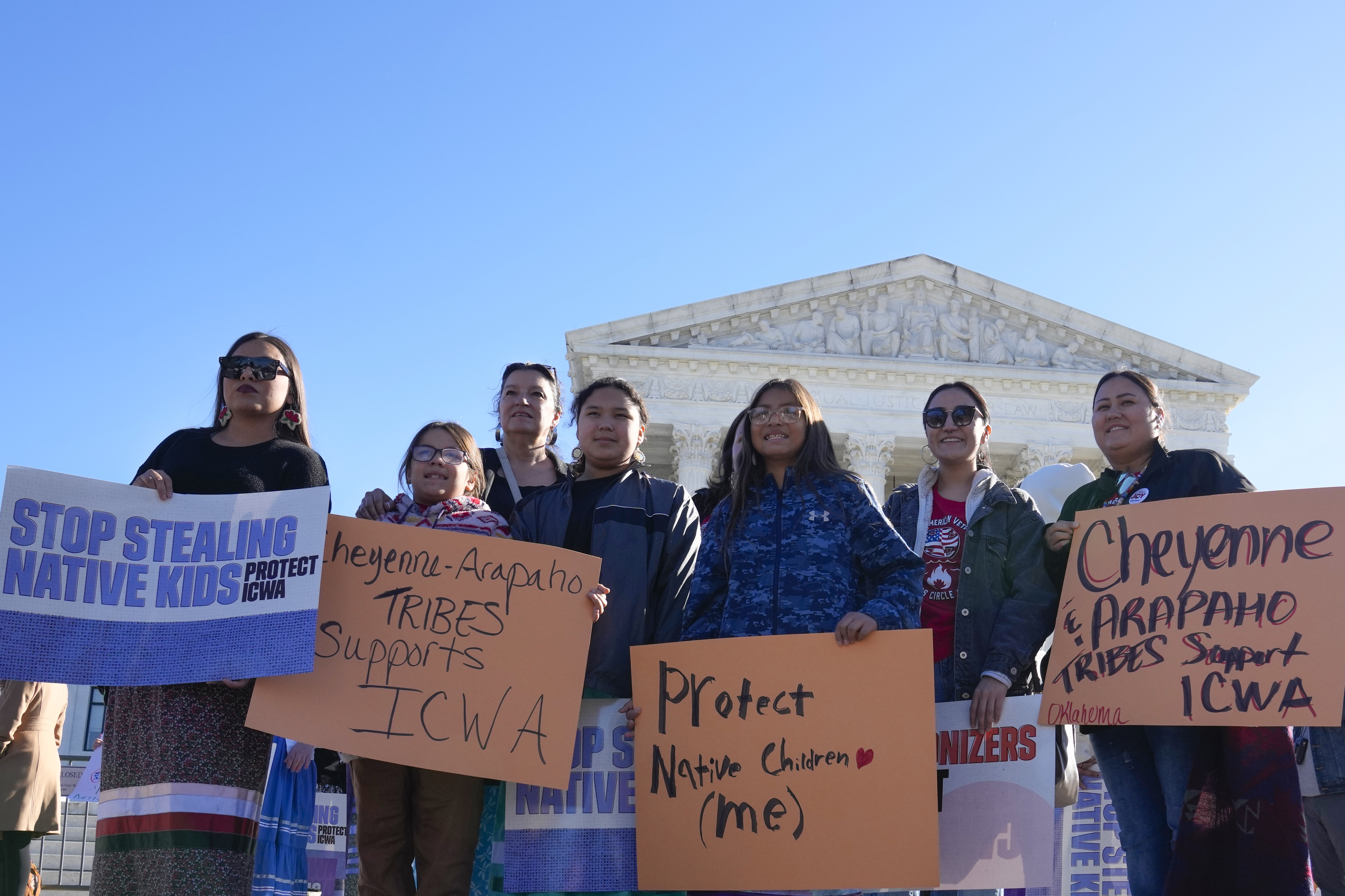
The United States Supreme Court has upheld federal requirements that Native American and Indigenous tribal members must be given preferences in the adoption or temporary fostering of Native children.
The ruling 7-2 ruling released on Thursday by the top court shot down a challenge to the Indian Child Welfare Act of 1978, which among other provisions, set federal standards for removing Native children from their families and placing them for foster care or adoption. It required that “preference” be given to members of a child’s extended family, other tribe members or “other Indian families”.
In a tweet before the ruling, the Cherokee Nation, which boasts 450,000 citizens, said the challenge to the law risked separating Native American families, diluting tribal nation sovereignty and damaging cultural preservation.
On Thursday, Cherokee Nation Principal Chief Chuck Hoskin Jr called the ruling a “major victory for the Native tribes, children, and the future of our culture and heritage”.
“We hope this ruling will lay to rest the political attacks aimed at diminished tribal sovereignty and creating instability throughout Indian law that have persisted for too long,” he said in a statement.
More than three-quarters of the 574 federally recognised tribes in the country and nearly two dozen state attorneys general across the political spectrum had come out in support of the law.
Cherokee Nation Principal Chief @ChuckHoskin_Jr issues statement after #SCOTUS upholds #ICWA pic.twitter.com/AtV83oNGBb
— Cherokee Nation (@CherokeeNation) June 15, 2023
At the time of the passage of the law, between 25 percent and 35 percent of all Native children in the US were being removed from their homes, with about 85 percent “placed outside of their families and communities—even when fit and willing relatives were available”, according to research cited by the National Indian Child Welfare Association.
The latest challenge stemmed from a lawsuit first filed in 2017 against the US Department of the Interior and federal officials by the state of Texas and three non-Native American families who sought to adopt or foster Native American children.
The lead plaintiffs in the Supreme Court case – Chad and Jennifer Brackeen of Fort Worth, Texas – adopted a Native American child after a prolonged legal fight with the Navajo Nation, one of the two largest Native American tribes, based in the Southwest. The Brackeens are trying to adopt the boy’s half-sister, now four years old, who has lived with them since infancy. The Navajo Nation has opposed that adoption.
Among other claims, the plaintiffs said the statute racially discriminates against non-Native Americans, violating the Constitution’s Fifth Amendment guarantee of equal protection under the law, and that it oversteps state rights by unconstitutionally directing the actions of state agencies in adoption matters.
A federal judge ruled in favour of the challengers on both claims in 2018, and while an appeals court later narrowed the ruling in 2021, it also affirmed the invalidation of certain parts of the law.
The Supreme Court handed down a major decision Thursday in the Haaland v. Brackeen case, affirming the constitutionality of the Indian Child Welfare Act by a 7-2 vote.
The decision represents a major victory for federal Indian law. https://t.co/nOCK9mcShA
— Lakota People's Law Project (@lakotalaw) June 15, 2023
Writing for the seven-justice majority in the opinion released on Thursday, conservative Supreme Court Justice Amy Coney Barrett noted that the law “requires a state court to place an Indian child with an Indian caretaker, if one is available. That is so even if the child is already living with a non-Indian family and the state court thinks it in the child’s best interest to stay there.”
She added that the “issues are complicated”, but the “bottom line is that we reject all of the petitioners’ challenges to the statute.”
Justices Clarence Thomas and Samuel Alito dissented, with Alito writing that the decision “disserves the rights and interests of these children”.
Defenders of the law have said that singling out “Indians” in legislation is allowed under both the Constitution and Supreme Court precedents, because the designation is considered political.
Advocates have warned a ruling against the law could have had much wider implications for the constitutionally recognised sovereignty of tribal nations.
Some saw the threat to the 1978 law as a reflection of the dark past of the forced removal and assimilation of thousands of Native American youths at government-administered boarding schools in the US throughout the 19th and 20th centuries.
A Department of the Interior report released last year found that the US boarding school system was “expansive”, consisting of 408 “federal Indian boarding schools” across 37 states and territories, including 21 schools in Alaska and seven schools in Hawaii. The report found that hundreds of children died in the boarding schools, identifying at least 53 burial sites.
Officials have said the number is likely to climb into the thousands or tens of thousands as the investigation continues, although the Department of the Interior has not said when the planned second report on the schools will be released.
In a statement hailing the ruling on Thursday, US President Joe Biden said “our Nation’s painful history looms large over today’s decision.”
“In the not-so-distant past, Native children were stolen from the arms of the people who loved them. They were sent to boarding schools or to be raised by non-Indian families – all with the aim of erasing who they are as Native people and tribal citizens,” he said.
“These were acts of unspeakable cruelty that affected generations of Native children and threatened the very survival of Tribal Nations. The Indian Child Welfare Act was our Nation’s promise: never again.”







